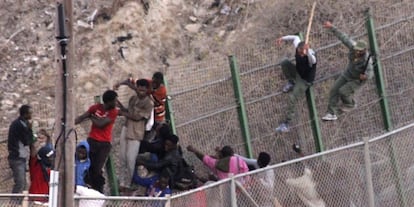Melilla Civil Guard chief investigated over African migrant deportations
NGOs claim that on-the-spot handovers violated existing agreements between Spain and Morocco

A court in the Spanish north African exclave of Melilla is investigating the local Civil Guard chief for allegedly carrying out on-the-spot handovers of illegal sub-Saharan migrants trying to jump the border back into Moroccan territory.
The events under investigation took place on June 18, when a group of 400 Africans attempted to jump the triple-layer security fence that separates Melilla from Morocco. Half of them got stuck in the spaces between the barriers, and were allegedly marched back to Morocco by the Civil Guard.
Under Spanish law, illegal immigrants who make it on to Spanish soil cannot be immediately deported, but must be taken to a temporary holding center to receive medical assistance and be identified. They should then be released until they are served with official deportation papers, a process that can take months. Some migrants are flown to internment centers on the Spanish mainland under court order, but can only be held for a maximum of 60 days, after which they are released again.
The non-profit groups claim that many of the migrants were from Mali and thus potentially eligible for asylum
However, a 1992 agreement between Spain and Morocco allows for the possibility of near-immediate deportation as long as certain minimum guarantees are met. No such procedures were followed in this case, according to the complaint filed against Civil Guard Colonel Ambrosio Martín Villaseñor by three immigrant support associations: Prodein, Andalucía Acoge and SOS Racismo.
Judge Emilio Lamo de Espinosa is also investigating similar actions by the Civil Guard on August 13, when another 600 undocumented Africans attempted to reach Melilla. The non-profit groups claim that most of them were Malian citizens and thus potentially eligible for asylum.
The magistrate has noted that video footage obtained on June 18 shows Moroccan police beating a immigrant within Spanish territory, as the fence is visible in the background. This could constitute failure to help on the part of the Spanish forces.
Thousands of African immigrants have been making coordinated attempts to jump the borders that separate Morocco from Ceuta and Melilla, Spain’s two exclaves in north Africa. The pressure on the frontier has led local authorities to ask Madrid for help, and in turn the central government has requested assistance from the European Union in patrolling its southernmost border.
Europe’s border control agency, Frontex, revealed last month that illegal immigration to Spain grew nearly 130 percent in the first three months of 2014, second only to Italy, which experienced a 600-percent rise.
Tu suscripción se está usando en otro dispositivo
¿Quieres añadir otro usuario a tu suscripción?
Si continúas leyendo en este dispositivo, no se podrá leer en el otro.
FlechaTu suscripción se está usando en otro dispositivo y solo puedes acceder a EL PAÍS desde un dispositivo a la vez.
Si quieres compartir tu cuenta, cambia tu suscripción a la modalidad Premium, así podrás añadir otro usuario. Cada uno accederá con su propia cuenta de email, lo que os permitirá personalizar vuestra experiencia en EL PAÍS.
En el caso de no saber quién está usando tu cuenta, te recomendamos cambiar tu contraseña aquí.
Si decides continuar compartiendo tu cuenta, este mensaje se mostrará en tu dispositivo y en el de la otra persona que está usando tu cuenta de forma indefinida, afectando a tu experiencia de lectura. Puedes consultar aquí los términos y condiciones de la suscripción digital.








































